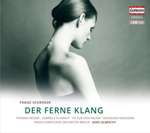|
Back
09/02/2013
Franz Schreker: Der ferne Klang
Gabriele Schnaut (Grete), Thomas Moser (Fritz), Victor von Halem (Old Man Graumann), Barbara Scherler (Mrs. Graumann), Johann Werner Prein (The Host), Julia Juon (Altes Weib), Hans Helm (An Actor), Siegmund Nimsgern (Dr. Vigelius), Barbara Hahn (Milli, Waitress), Gudrun Sieber (Mizzi, Girl), Gertrud Ottenthal (Mary, Chorister), Rolf Appel (An Individual), Peter Haage (First Chorister), Roland Hermann (The Count), Robert Wörle (The Chevalier), Gidon Saks (The Baron, Second Chorister, Policeman), Claudio Otelli (Rudolf), Rias Kammerchor-Rundfunkchor Berlin, Dietrich Knothe (Chorus Master), Radio-Symphonie-Orchester Berlin, Gerd Albrecht (Conductor)
Recording: Jesus Christ Church, Berlin, Germany (October 16-20, 1990) – 139’50
Capriccio #C5178 – Booklet in German and English

   
Franz Schreker lived in the shadow of Richard Strauss yet the name is heard infrequently. Ironically, Schreker’s music back then was equally acclaimed when sizing up with Strauss. The orchestration contains a “Germanic Impressionism”, laced with Debussy-esque ethereality and broad punctuations of dramatic harmonics and chromatic lyricism.
In today’s age, Schreker’s major advocate would be James Conlon, current Music Director of Los Angeles Opera. During directorships in Germany, Conlon discovered a symphonic work by Alexander von Zemlinsky that ultimately spawned into something even more grand when moving to Southern California: the inception of Recovered Voices, a multi-year project dedicated to bringing works to the stage showcasing composers who were squelched by Hitler. My personal attestations can confirm such an extraordinary undertaking. Personal reviews have featured Zemlinksy’s Der Zwerg and Viktor Ullmann’s Der zerbrochene Krug (live performance & DVD recording) and Franz Schreker’s Die Gezeichneten) among others.
Schreker’s first opera, Der ferne Klang (The Distant Sound) (1912), was an instant success, riding on the coattails of his ballet music, Der Geburtstag der Infantin in 1908, based on the Oscar Wilde story, The Birthday of the Infanta. Schreker, forever cynical about poets or journalists due to their monetary ambitions, ended up writing all of his own librettos.
What’s special about Der ferne Klang is that Schreker in many ways lived vicariously through the protagonist Fritz which is sung with erudite radiance by Thomas Moser. Gabriele Schnaut’s brassy chirpiness is a softened derivation of Edita Gruberova in the role of Grete. The delineation of her character comes across with clarity and sympathy. Victor von Halem has a beautifully rich bass voice that reveals itself in a fitting Old Man Graumann.
The music contained within Der ferne Klang is captivating, exhilarating and grandly sophisticated. Schreker’s music is like “an irrepressible itch”; one will want to continue to keep listening and listening until its final, abrupt conclusion. The last few bars end with an excruciating cry and tragic chording in uncanny resemblance to that of Zemlinsky’s Der Zwerg. One can hear shadings of Nielsen’s Maskarade (1906). Those familiar with Schreker’s third opera, Die Gezeichneten, will find similarities in terms of its hedonistic polytonality, sweeping panoramic music, Far East mystical touches and clever blends of percussion values. The “Zwischenspiel” (“Interlude”) leading into Act III is intriguing and ravishing, distant and mysterious...magical. Klang’s choral responses are quite arresting, similar in scope to those found in Act I, Scene III (“Hoé! Hoé! hisse hoé!”) from Pelléas et Mélisande (1902).
This complete recording, originally captured in 1990, has been remastered under the Capriccio label. The restoration is rich in sound and acoustics. The booklet, a tad cursory, could better serve the public had it spelled out the full libretto. Just on the basis of small snippets excerpted from Schreker’s libretto would signify that the composer was just as poetically creative with words as he was with music. Shunning sources other than himself for text as the foundation of his operas places more importance on seeing the two art forces come together in a cohesive format.
Christie Grimstad
|